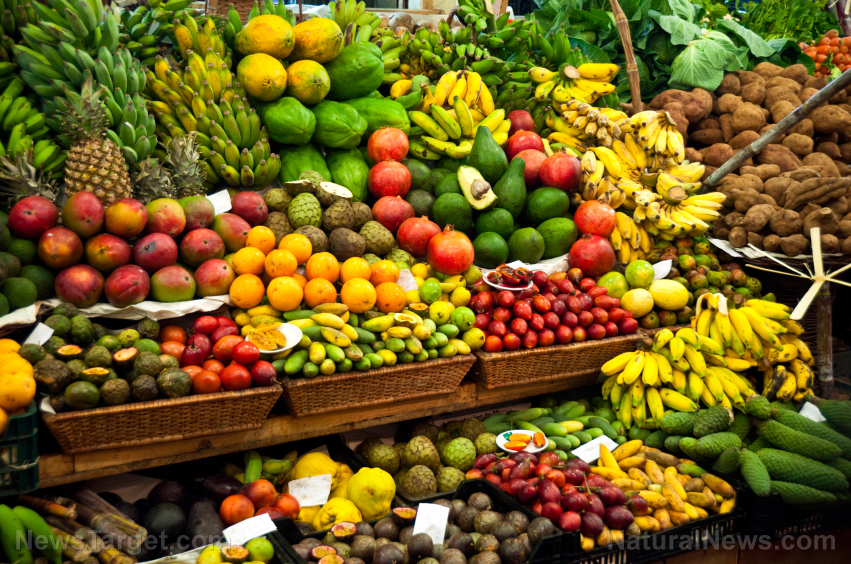I have never heard of this, but it is in most plants along with Vitamin C which likely explains our lack of attention. It is apparently useful in suppressing alergic effects and that is a poorly understood area, but certainly real enough.
It obviously deserves much more attention.
What is not clear yet is what foods optimize access and are thus potentially beneficial to allergy sufferers.
.
Powerful healing effects of taking quercetin and vitamin C
Tags: allergies, anti-inflammatory, anticancer, antioxidant, food is medicine, fruits, goodhealth, heart health, Heavy metals, natural cures, natural healing, neurodegenerative disease, nutrients, nutrition, nuts, quercetin, supplements, vegetables, vitamin C
https://www.naturalnews.com/2018-07-26-powerful-healing-effects-of-taking-quercetin-and-vitamin-c.html#
(Natural News)
Your body can be compared to an extremely complex machine. For it to
function normally and keep itself safe from potential threats, such as
disease, it needs to take nutrients from your environment, specifically,
through your diet.
Quercetin is one of the many natural chemicals you obtain from eating plants. Although not as well-known as most antioxidants, it can do wonders for your body, especially when supported with vitamin C.
You most probably know vitamin C, otherwise known as ascorbic acid.
This natural chemical occurs in most fruits and vegetables and is a
powerful antioxidant. Its role in boosting your immune system and
protecting your cells from oxidative damage has helped cement its
reputation as a natural shield from many types of disease.
Benefits of quercetin
Quercetin is a less known flavonol, but it is fairly common. Found in
fruits, leaves, flowers, and seeds, its primary function is protecting
plants from threats, such as infections and toxins in the environment.
When ingested and paired with vitamin C, it benefits your body, too.
It is an antioxidant
Just like vitamin C, quercetin is a potent antioxidant. It scavenges
free radicals, molecules that damage your cells and lead to various
diseases like cancer and neurodegenerative conditions, such as Alzheimer’s disease.
It also acts as a booster for other antioxidants in your body. For
instance, it helps in the production of glutathione, considered as your
body’s “master antioxidant.”
It is anti-inflammatory
Aside from its antioxidant properties, it also mitigates the
occurrence of inflammation in your body. Inflammation is part of your
immune response, particularly in the presence of toxins and bacteria,
but too much of it can lead to serious health conditions, including
heart disease and cancer. Quercetin has been found to inhibit the
expression of the pro-inflammatory molecule cyclooxygenase (COX).
It protects against heavy metals
Your body collects various heavy metals from your environment,
including the food you eat. This is one of the reasons it is essential
to avoid plants that were treated with insecticides, for instance. High
concentrations of heavy metals like aluminum, cobalt, nickel, and lead,
can lead to metal toxicity. Quercetin was found to have chelating
properties that help limit the risk of toxicity from lead, as well as
reducing its levels in the body.
It protects against allergies
One of the most important applications of quercetin has to do with
its role in fighting allergies. It inhibits the release of histamines,
which makes it effective against common allergy symptoms like itching,
hives, and watery eyes. Additionally, it may be taken ahead of exposure
as a means of preventing allergies. It is also being studied as a
treatment against more serious complications, such as anaphylactic
reactions.
A separate but related benefit has to do with its ability to suppress
leukocytes in both the bloodstream and the lungs. This leads to relaxed
airway passages and more elastic lung tissue. This effect makes
quercetin a potential treatment for asthma, which is usually triggered
alongside allergies.
It is heart-friendly
Aside from its antioxidant properties, which reduce the risk for cardiovascular disease, there are other reasons why quercetin is good for the heart.
Some studies indicate that it helps lower and normalize high blood
pressure, a common precursor to heart disease. Animal studies even
reveal that this antioxidant can inhibit cardiac hypertrophy, one of the
off-shoots of hypertension.
Quercetin also makes platelets less “sticky,” helping thin out the
blood. It promotes the production of nitric oxide, an important chemical
that dilates the blood vessels. These effects further lower the risk of
heart attacks caused by stifled blood flow.
Discover other benefits of ingesting quercetin by following Veggie.news.
Sources include:

No comments:
Post a Comment